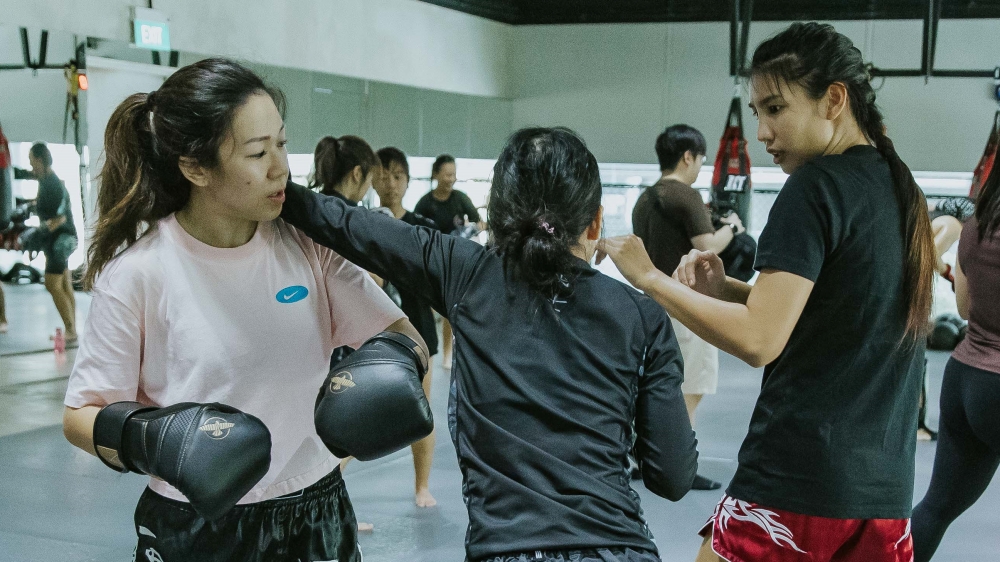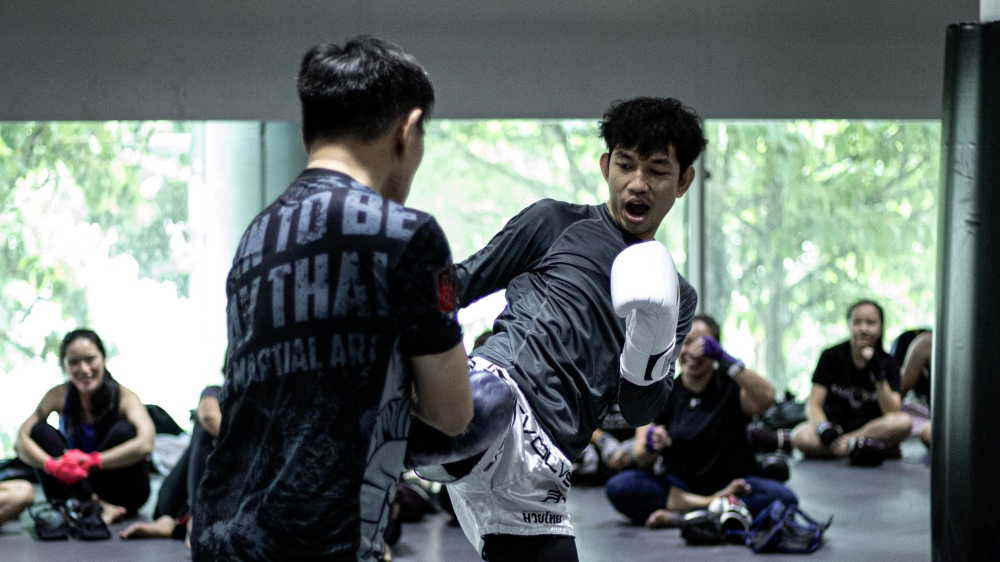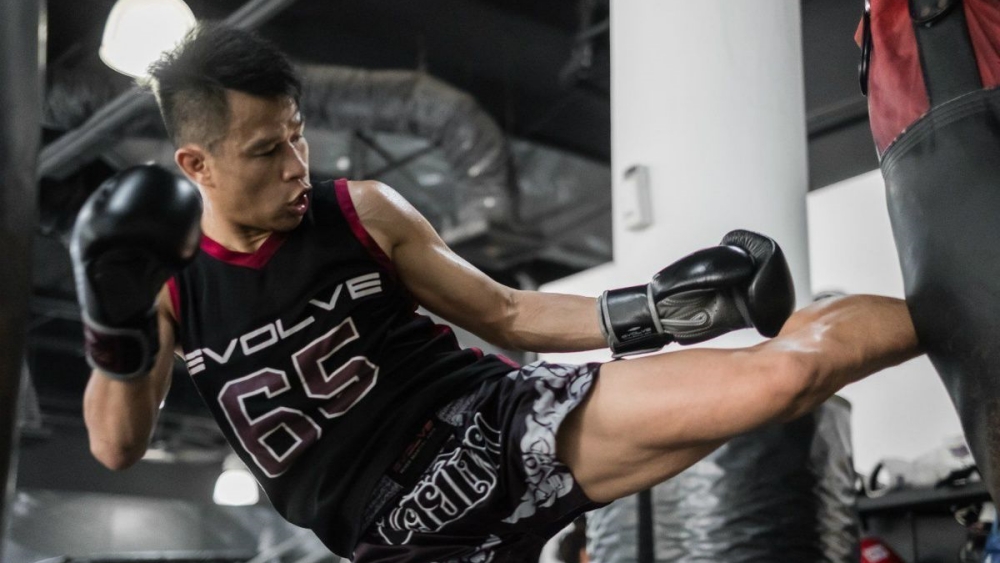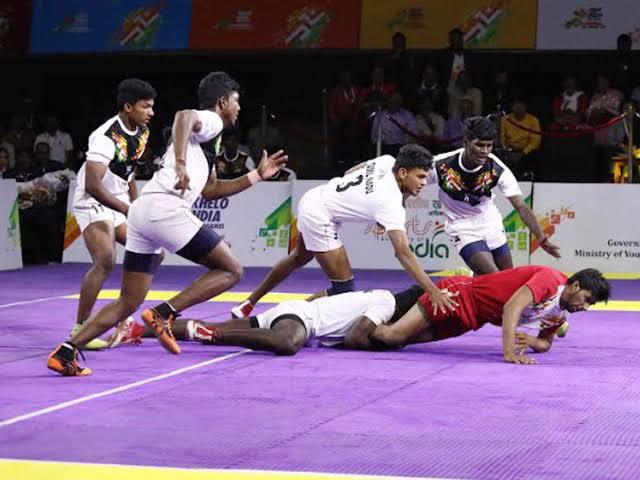When you first started your Muay Thai journey you were probably bursting with excitement. You went to every session possible, lapping up every bit of knowledge and advice given to you by your coaches and training partners. You bought all your gear brand new and spent hours watching YouTube videos as you tried to find the best way to wrap your hands. You probably started watching every fight you could, whether it was live or online, dreaming of the day you could step over the ropes yourself. After a year of regular training, it’s pretty easy for complacency to set in. The exciting journey you started traveling twelve months ago can sometimes feel like a haggard march and though you still love it, motivation can be lacking.
Complacency can show itself in a number of ways and not all of them are obvious but once it shows itself it can infect your training, undermining your well-intentioned goal to improve your Muay Thai game. In this article, we are going to reveal the 4 most common ways that complacency can set into your training. Making any of these mistakes can hamstring any efforts you make to improve at Muay Thai so if you notice any of these trends in yourself it’s time to break them before they become habits.
Common Ways Complacency Can Show In Your Training:
1) You Are Constantly “Late” To The Warm-Up
A common way that complacency shows is in the warmup or, more accurately, it shows when you don’t warm up. Warming up tends to be dull and repetitive. Skipping, jogging, and shadowboxing for ten to fifteen minutes before every training session can be a chore. You’re not learning anything new or exciting and it’s pretty easy to make excuses to avoid it such as the classic, “I had to run an errand,” “I’ve done stretches along the way,” and “I needed to redo my hand wraps two or three times.”
The thing is, if you don’t get your heart rate up and your muscles loosened before the real training starts, then you’re going to need to do it while you’re drilling and hitting pads. This is the time you are sharpening your weapons or developing new skills and your improvement will be limited if you spend this valuable time with your hips and shoulders too tight to move properly. So, if you want to make sure you get the most out of training, make sure you are on time for the warm-up!
2) You Stop Asking Questions

Questions are opportunities for growth, and each one contributes to your personal martial arts journey. So remember – don’t be afraid to ask questions!
A surefire sign of complacency in training is a lack of curiosity. When you’re repeating the basics, as you’re bound to do in training, it is easy to think that you don’t need to ask any questions. You’ve done it time and time again and because it feels fluid, it’s easy to assume you’ve mastered it. When you’re learning something new, you might feel confident enough in your abilities that you’re certain you’ll master it right away but no matter the reason, if you’re not asking questions then you’re doing yourself a disservice.
If you aren’t asking your coaches or training partners questions like, “What are the benefits of this technique?”, “Is there any way I can improve on that?” or “When would I use this move?” then chances are you’ve become complacent, and your development will suffer.
3) You Stop Practicing The Basics
Basics win fights. It’s a simple saying, repeated throughout every Muay Thai gym that, though verging on becoming a cliché, is nonetheless true. Superlek made his career off of his right roundhouse kick while Yodsanklai Fairtex made his off of his left leg and Samart became an icon utilizing his teep. Over ninety-five percent of the techniques you’ll throw in a fight are your basic, run-of-the-mill techniques but after a year of refining your jab and blocks in every session, you might become bored and when you do drill them, you check out mentally. This is when mistakes start to creep in.
While it is more exciting to throw acrobatic jumping and spinning techniques, they shouldn’t become the main focus of your training. You’ll be lucky to throw them even once in a fight while you can be guaranteed that you’re going to need to teep, punch and block kicks more than a dozen times a round. So, no matter how repetitive it may be, you’re going to have to practice your basics because basics win fights.
4) You Stop Trying New Things In Sparring

It’s through sparring that you explore new combinations and discover creative ways to execute the moves you’ve learned!
While you cannot avoid repeating your basic techniques over and over again in training it is important not to fall into a tired and predictable pattern when you’re sparring. When you get complacent, and you stop looking for new ways to apply your bread-and-butter techniques or you find a comfortable routine and keep using the same style again and again because you know that it works for you, chances are that you’ve become complacent.
This kind of pattern doesn’t bode well for your development and if you want to keep improving then you need to keep yourself uncomfortable during your sparring rounds. If, after a year, you find that you are most comfortable fighting at long range with kicks, then spend some time engaging as a puncher. If you love counter-fighting and can outpoint everyone in the gym, then try initiating exchanges. Staying out of your comfort zone in sparring is a great way to continue developing and it helps shake off the malaise of complacency that can hinder your Muay Thai development.
In Summary
After a solid year of Muay Thai training it is common to find yourself begrudging your set training routine. Once you’ve mastered the basics it is easy for complacency to set in and when it does, your development suffers. Keep an eye out for these four common symptoms of complacency. They can sneak into your mindset and training very slowly and once these mistakes take hold, they can steal the joy you found in your Muay Thai journey.
You may also like:
Turning The Corner: Tips And Tricks To Get Out From The Corner Ring Ropes In Muay Thai
Mastering Precision In Your Muay Thai Kicks
Good posture comes with its share of perks like helping you make a better first impression when you meet new people. Good posture gives you an air of authority and makes you appear taller than…
The body clinch and throw is an effective technique, commonly used by many Muay Thai fighters when they are locked in a clinch battle with a taller opponent. If you are ever up against a…
There is a common misconception in Muay Thai that the fighter showing the most aggression in a bout will impress the judges and alongside this view is the idea that fighting with your back on…
Muay Thai is widely considered to be the most effective stand-up fighting system in the world. It’s an ancient martial art that allows the use of punches, kicks, knees, elbows, throws, sweeps, and clinch fighting….
In Muay Thai, Superlek Kiatmookao is without a doubt one of the best strikers on the planet. The multisport veteran is a multiple-time Lumpinee World Champion and WBC Super Lightweight Muay Thai World Champion. He…
Muay Thai is a diverse sport with many different styles. The ability to throw eight different weapons, both at range and from the clinch, gives fighters the amazing opportunity to fight utilizing a whole range…
In an MMA and wrestling match, the suplex is one of those techniques that will surely capture an audience’s attention. Some may think it is not for everybody and requires one to be an athletic…
Martial art classes for kids might just be what you need to get your child off the couch and go break a sweat. Obesity rates among adolescents and children between the ages of 5 to…
Getting yourself pumped up to start a new workout routine is only half of the equation; staying motivated long enough to see the result of your hard work can be just as challenging. However, once…
The Philly shell is a defensive stance in boxing that’s characterized by a boxer keeping their lead shoulder up and tucked in toward their chin while leaning away slightly from their opponent. The boxer’s lead…
In Brazilian Jiu-Jitsu and Submission Grappling, the rise of the leg lock game over the past years has been nothing short of fascinating. John Danaher famously said that leglocks and takedowns were the few weaknesses…
Cornermen and women are the unsung heroes of martial arts. They rarely get any credit for the performances their fighters deliver during matches and their roles extend way beyond simply providing moral support for their…













